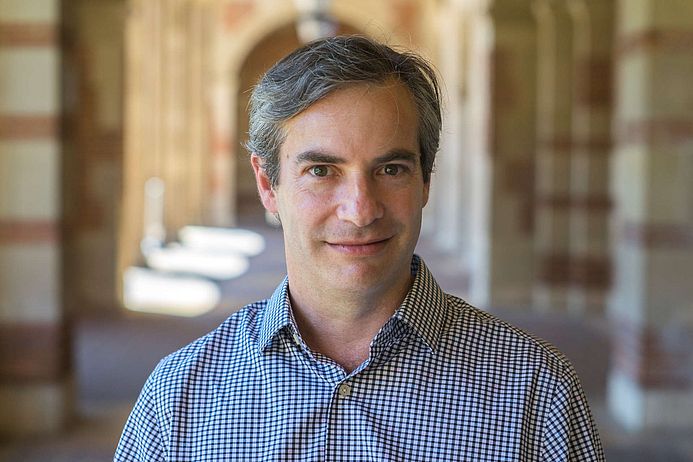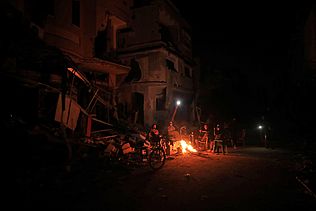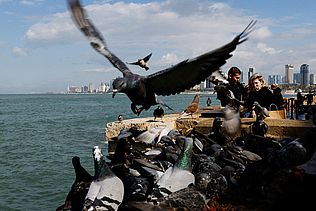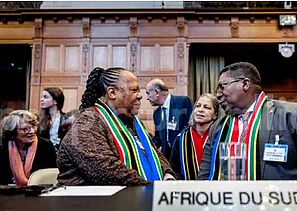medico: In the German edition of your book “Multidirectional Memory” you say that the year 1993 was a year “in which the echo of the past was very strong and in which the Holocaust was often appropriated for dubious purposes”. Where are we now, 30 years on, one Hamas massacre with more Jewish deaths than at any time since the Holocaust, and five Gaza wars later? What kind of year or even breaking point was 2023?
Michael Rothberg: The American television news program Nightline identified 1993 as “The Year of the Holocaust,” because it was then that the United States Holocaust Memorial Museum was opened and the film Schindler's List was released. At the same time neo-Nazi activities in Europe increased, the genocide in Yugoslavia began and one year later a genocide would took place in Rwanda. Retrospectively it was the post-Cold War moment in which Holocaust memory was “globalized” and linked to a universalist vision of international human rights. That vision has been fraying for the past several years because of the rise of the populist right around the globe, but recent events may pose an even greater challenge to the previous consensus.
It seems very possible that, thirty years later and under very different circumstances, 2023 will also inaugurate a new moment in Holocaust memory. What will this moment look like in retrospect? It’s probably too early to say. Holocaust memory has always been contested and never uniform in its effects, but it seems possible to me that 2023 will mark a moment of radical divergence. For some, the attacks of October 7 have reinforced the belief that a Jewish state is necessary for the survival of the Jewish people and avoidance of a repetition of the Holocaust; all necessary means will be justified to achieve those ends. Others, in contrast, see the war in Gaza as the moment when Holocaust memory became completely inverted and was invoked in order to provide cover for “ethnic cleansing” and the potential perpetration of genocide against a different group. Those positions are already visible—whether they solidify into an unbridgeable gulf or not will probably depend on how the rest of the war plays out and what we find out about the extent of Palestinian losses.
Ironically, in the months before the Hamas attacks, I actually had a feeling of optimism. I was particularly struck not only by the ongoing protests in Israel—which for the most part did not make the occupation central—but also by developments in the Jewish diaspora, where a more critical perspective on Israeli policies did seem to be emerging. One piece of evidence for that optimism would be the “Elephant in the Room” letter, which collected thousands of signatures from Jewish intellectuals of quite different political perspectives, even though the letter clearly used the language of apartheid to refer to the situation of Palestinians under Israeli rule. After October 7 we’ve returned to a more polarized situation—possibly more polarized than ever. I’m not sure when we will ever get back to that more optimistic moment.
The “Historikerstreit“ (historian’s dispute) 1986/7 was not just about equating National Socialism and Stalinism or Auschwitz and the Gulag, but also about evading responsibility for the genocide or relativising it, you say in “Multidirectional Memory”. Currently, some are comparing the Hamas attack from October 7 with the Holocaust and call it a genocide, while others are describing the bombing of the Gaza Strip by Israel as genocide. What are the intentions behind those comparisons?
I think that the association of October 7 with the Holocaust was, on the one hand, a spontaneous symptom of shock and horror at the violence that unfolded on that day. On the other hand, that association has been easily instrumentalized by those seeking to justify the Israeli response: if October 7 was another Holocaust or “rupture in civilization” (Zivilisationsbruch), as some have argued in the German context, then almost any response, no matter how harsh, is allegedly legitimate, as I mentioned earlier. For those describing the bombing and invasion of Gaza as a genocide, the motivations are somewhat different. First, it is an attempt to invoke the categories of international law and to test whether international law can have any positive impact in this context. But above all, I think it’s an attempt to draw attention to the extremity of the violence and especially to try to bring it to a halt. This was Masha Gessen’s argument: comparison to the Holocaust can be a way of stopping the violence before it actually becomes genocidal. In Gessen’s Hannah Arendt Prize lecture, they wrote: “this is why we compare. To prevent what we know can happen from happening. To make ‘Never Again’ a political project rather than a magic spell.”
As we know from the proceedings of the International Court of Justice (ICJ), it will take years before we have a legal ruling on the genocide question in the case of Gaza. The Hamas attacks should also be investigated as potential war crimes or crimes against humanity. Such legal questions are important in the long run, but my own perspective, like Gessen’s, is that the urgent issue right now is stopping the killing and preventing the death of many thousands more in Gaza by starvation or disease.
The journalist, author and translator Masha Gessen who received the Hannah Arendt Prize in December, has been accused of making illegitimate comparisons between Gaza and the Warsaw Ghetto, even though they argued in a differentiated way and did not equate the two. Why do you think the reaction in Germany was so strong?
Masha Gessen’s comparison between Gaza and a Nazi-constructed ghetto was, I believe, deliberately provocative. It came in the context of a powerful critique of German and European memory culture and the way that Holocaust remembrance can warp attitudes toward politics in Israel/Palestine. The response from Germany was relatively unsurprising given developments of the past few years—and especially of the post-October 7 moment. There is clearly no hesitation at this point in Germany in accusing Jewish intellectuals and artists of “relativizing” the Holocaust or even of antisemitism.
I don’t know exactly how we’ve gotten to this point, but we can see developments over the past couple of decades leading in this direction. As remembrance of the Holocaust became increasingly ritualized and integrated into the logic of the state after unification in 1990, a self-critical approach to memory became a self-satisfied one. We are far from the period of the 1980s when grassroots movements created new memory sites and artists designed critical, antifascist “countermonuments” (Gegendenkmäler). The German media and political classes seem to believe that they have the proper understanding of what the Holocaust was and how to memorialize it. They are out of touch with scholarly developments in Holocaust and genocide studies and have become extremely intolerant of any alternative understandings of history or memory—understandings they usually do not actually comprehend.
Even before, but increasingly after October 7, anti-Semitism in Germany has been blamed on Muslims in right-wing debates, which are becoming more and more mainstream. This allows two birds to be killed with one stone: non-migrant Germans can externalize anti-Semitism to those whom they already deny any affiliation to Germany, and at the same time lend weight to their remigration fantasies by demanding the deportation of anyone who is not unreservedly committed to Israel. Neukölln has become a paradigm for "Muslim anti-Semitism". The NZZ, for example, ran the headline: "In one part of Berlin, Muslim anti-Semitism is now mainstream".
Together with Yasemin Yildiz, you have created a migrant archive of Holocaust remembrance. To this end, you spoke about Lebanese, Kurdish, Turkish, Sri Lankan and other Neukölln residents who have had traumatic experiences of political violence themselves but also engaged with the Holocaust. How do you perceive the current debates about Neukölln and Muslim anti-Semitism in Germany against this background?
I think the current discourse on “Muslim antisemitism” is a continuation of a discourse that has been in place for about twenty years. Yasemin Yildiz and I first started noticing this tendency around 2008 when we encountered various groups in Berlin that had been created to counter an alleged growth in antisemitism among migrants and Muslims. We were perplexed about why, all of a sudden, this concern had emerged that seemed to displace discussion of the antisemitism at the center of German society as well as on its far-right fringes. From Esra Özyürek’s book Subcontractors of Guilt, we know that these groups started attracting funding already in the first few years of the twenty-first century. Her metaphor of “subcontracting guilt” captures that process of displacement of concerns about antisemitism from the center to the margins of German society. In that sense, the current debates about Neukölln and “Muslim antisemitism” sound very familiar, even if the situation today is particularly charged. I do not doubt that antisemitism exists across German society, including among Muslims, but the politicization of the definition of antisemitism—for example, the way that the IHRA definition is used to stifle criticism of Israeli policies—makes it very difficult to reach consensus on what is and what is not antisemitic.
I think that immigrants, including “Muslim” immigrants, continue to engage in creative and valuable ways with Holocaust memory. One example I’ve written about recently is a short essay by Wafa Mustafa, a Syrian refugee and activist, who engages in a very significant way with the Holocaust as well as the plight of Palestinians and the devastation of the war in Syria. The dominant German gaze would term what she does “antisemitic” just by virtue of juxtaposing those different instances of political violence, but her essay is the farthest thing from antisemitic.
There is one thing that seems somewhat different to me today, at least compared to when we started following this discourse fifteen years ago: the greater presence of progressive Jews, sometimes Israeli Jews, in these debates. A significant number of Jews in Germany are contesting the dominant discourse on Muslim antisemitism and demonstrating solidarity with Palestinians. These kinds of alliances—among Jews, Palestinians, Muslims, Arabs, etc.—are crucial. I think remembrance of the Holocaust plays a powerful role here, at least for some people. The slogan that Jewish Voice for Peace in the US has used is “Never again for anyone”—a non-relativizing universalization of the lessons of the Holocaust that I also see among some activists in Germany.
For the far-right misanthropes of the AfD, who have already made anti-Semitic statements themselves, the accusation of anti-Semitism and their own declarations of solidarity with Israel have become a perfect instrument that gives them access to the political mainstream and at the same time serves as a vehicle for implementing their racist goals. How could this happen?
The far-right instrumentalization of antisemitism and solidarity with Israel is one of the most disturbing developments of recent years. I don’t have a particular explanation for how it happened, but I can say that this legitimation strategy is quite widespread and includes the Christian right in the United States as well as various populist governments in eastern Europe. Maybe the right question is not how could this happen, but how can we effectively oppose it? For me, the only viable strategy is one that involves alliances among different minority groups—in Germany that would mean Jews, Palestinians, migrants, Black Germans, people of color, etc. Such alliances will require an intersectional understanding of how hate and prejudice work and a commitment to solidarity that goes beyond one’s own community. I think this work is being done by many people; it’s difficult work, but it’s vitally important.
On a global scale the identification and solidarity with the Palestinians seem much stronger than, for example, with the Rohingya or the Uyghurs. If you share this observation: How can this be explained?
I think it’s probably true that both defense of Israel and solidarity with Palestinians are forms of identification that exceed what is found in other conflicts. As a Jewish person and as a citizen of the United States, I feel implicated in what is happening in the Middle East (and elsewhere), so I also understand the investment there. The genocide studies scholar Uğur Ümit Üngör just discussed this problem at length in an important essay in the Journal of Genocide Studies. As Üngör illustrates, the material dimensions of violence in Israel/Palestine are not, in fact, unique in comparison to other events in the region. He paraphrases an account by another Dutch scholar, Bart Wallet, who identifies several factors to help explain the disproportionate investment in the conflict: “a religious preoccupation with the area’s ostensible sacrality for the three major monotheisms; the fact that Jews as the main racialized ‘Other’ of Europe live there; politicization of the conflict along broader ideological lines; and Palestine as a cause célèbre in the Arab and Islamic world.”
I would just add that I don’t think that people’s attention to events must be proportionate and absolutely equitable—that seems like an impossible ideal and I don’t know how it could possibly be achieved. As someone who has argued against conceiving of memory according to the logic of the zero-sum game, I also don’t think that interest in Israel/Palestine blocks interest in other events in any straightforward way. Rather, if we want to address the fact that many cases call out for our empathy and solidarity, we need to think of “multidirectional” strategies that might bring greater attention to these other cases without suggesting that we should “diminish” our attention to what is unfolding in Palestine.
In December 1948, the United Nations General Assembly adopted the Genocide Convention in the wake of the Holocaust. Now Israel, where many Jewish survivors of the Holocaust fled to, is itself confronted with the accusation of genocide, which triggered an immediate defense reflex from the German government. Is this solely due to an absolutely rational reason of state and political solidarity or is it also an expression of the fact that it is difficult to understand that victims can become perpetrators and vice versa?
I certainly think it is disturbing to think of victims becoming perpetrators, but of course it’s not an unusual scenario at all. It forces us to confront our limited understanding of what it means to be a victim—the frequent assumption that victims are innocent and passive and are locked into an eternal, unchanging identity. But I’m not sure the complexity of understanding victims is the main issue in the German context. More than just a general difficulty in imagining a more nuanced relation between victims and perpetrators, there are specificities to the German investment in Israel.
Above all it seems that the righteousness of Israel and the innocence of Jews are central to German post-Holocaust self-conceptions. Germany’s redemption after National Socialism requires Jews to occupy a fixed position in what Michal Bodemann long ago called the German “memory theater.” The fact that Jews have become agents of all different sorts beyond the role assigned to them in that scenario as innocent victims—whether potential perpetrators of war crimes in Gaza or radical opponents of those war crimes on the streets of Berlin—troubles Germany’s own sense of virtue and collective identity. I don’t think this is the whole explanation, but I think it’s an important factor.
In a recent interview with the German newspaper taz, historian Omer Bartov said: "I don't like Nazi comparisons because then the Nazis always win. Everything doesn't look quite so bad in comparison, even if it's absolutely horrific." What do you think about that? What effect does the constant comparison with the Holocaust and the repeated accusation of genocide in different directions have on a society and its collective memory?
I think Omer Bartov raises an important point: the frequently articulated worry that the centrality of the Holocaust to discourses on human rights violations sets the bar so high that it can serve to excuse anything that falls short of a systematic genocide. Inversely, the constant repetition of Holocaust analogies and genocide accusations risks eroding their force and rendering political violence—even genocide—“normal.” Despite these real risks, invocations of the Holocaust remain a way of attracting attention, which is why I think such comparisons are so frequent.
Ultimately, Holocaust comparisons are ambivalent: they possess varied meanings and produce varied results. I myself am not someone who feels the need to make such comparisons for political reasons, but they are so ubiquitous that I think we have to take them seriously and figure out a way to evaluate them. That is why I suggest we need an “ethics of comparison.”
The first time I addressed the ethics of comparison was in the wake of the 2008-2009 bombing of Gaza, when Holocaust comparisons were frequent. Now, here we are again; the bombing is more intense and the comparisons are even more contested. An ethics of comparison will not stop the bombing, but it can provide us with some guidelines for evaluating these kinds of historical analogies. I suggest that we need to think both about how comparisons are made—whether they tend to equate, distinguish, or completely separate different events—and why they are made: do they seek to stoke conflict and violence or create solidarity among victim groups?
Instead of giving us a set of pre-formed answers ready to be wielded against opponents, an ethics of comparison can provide us with a flexible set of guidelines for evaluating—but not banning or “canceling”—provocative historical juxtapositions. If there is a justification for Holocaust comparisons it has to involve the warning function I mentioned earlier and it has to involve the creation of what I call “differentiated solidarity”: a version of solidarity that recognizes differences of experience and differentials of power. We might even say that solidarity requires comparison: an ability to connect individuals and groups with diverse interests in order to create a viable political force.
The interview was conducted by Ramona Lenz.
Michael Rothberg is the author of "The Implicated Subject: Beyond Victims and Perpetrators", "Multidirectional Memory: Remembering the Holocaust in the Age of Decolonization", and "Traumatic Realism: The Demands of Holocaust Representation".
Rothberg's book "Multidirectional Memory", which was published in German translation in 2021 by Metropol, represents an important intervention in the German discourse on appropriate commemoration of crimes against humanity. In solidarity with Israel and the victims of 7 October the conference "We still need to talk - Towards relational memory", planned for December 2023 and co-curated by Rothberg, has been postponed to an unspecified date by the Bundszentrale fuer politische Bildung.




